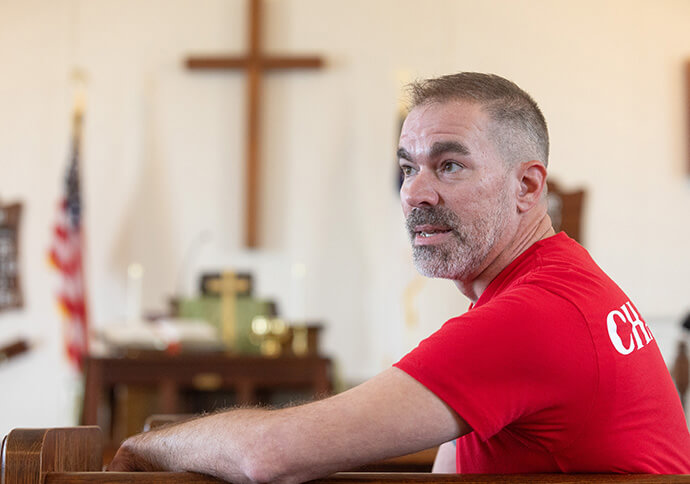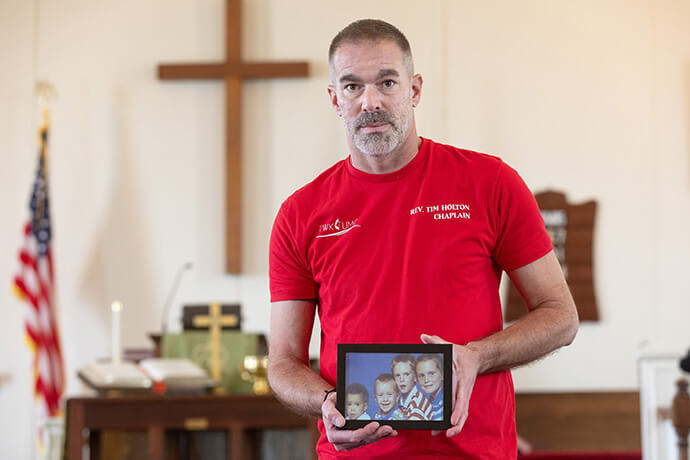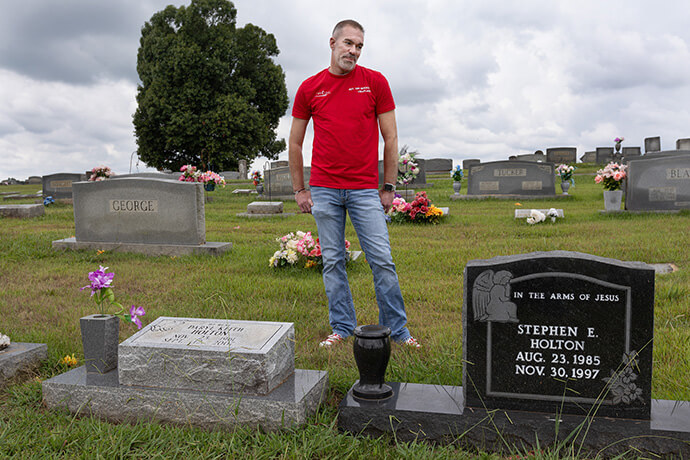Key points:
- Daryl Holton was executed in Tennessee’s electric chair in 2007 for the execution-style murder of his four children in 1997.
- The Rev. Tim Holton opposed the death sentence doled out to his cousin, even though Daryl Holton waived all appeals and accepted his own execution as appropriate.
- Holton visits death row inmates in Nashville every Tuesday, some of whom knew his cousin.
- The pastor of Caney Spring and Berlin United Methodist churches also is a board member of Tennesseans for Alternatives to the Death Penalty.
Dark clouds hovered in Simpson Cemetery as the Rev. Tim Holton pointed out the row of graves of four siblings — three boys and a girl. Their killer, who is also their father, is buried beside his oldest son. Stephen was 12 when his dad shot him in the head execution-style.
Stephen, Brent (10), Eric (6) and Kayla (4) are buried with Tickle Me Elmos, the hot Christmas toy of 1997. The children were all murdered the same day and way during Thanksgiving break that year.
Daryl Holton, who died in Tennessee’s electric chair on Sept. 12, 2007, firmly believed he did the right thing by killing his children as painlessly as he thought he could, because the courts kept the children in the custody of their mother, who he said was neglectful and abusive.
He believed that their lives among cockroaches and violence in a Murfreesboro, Tennessee, housing project were so bad, they were better off dead than with their mother, who has since died of COVID-19.
“He stood by that, and he felt that this is what God had told him to do,” said Tim Holton, Daryl Holton’s cousin and pastor of Caney Spring and Berlin United Methodist churches, about an hour south of Nashville.
“This is how you can love your children,” is his recollection of Daryl Holton’s thinking at the time.

The life of Tim Holton, who was in high school when the murders occurred, has been overcast by the tragedy ever since. Complicating matters, Daryl Holton, after his conviction for the murders, was determined to accept the death sentence and not pursue appeals.
In a 2009 documentary about the case, “Robert Blecker Wants Me Dead,” Daryl Holton said, “I think the death penalty is proportional to the crime.”
Blecker, a New York attorney who is a public proponent of the death penalty, met regularly with Daryl Holton until his death. Although they agreed about Daryl’s sentence, Blecker could not get the prisoner to back off his position that the murders of his children were necessary.
“Some people kill so cruelly, so callously, with such depravity that they deserve to die, and we have an obligation to execute them,” Blecker said in the documentary. “It clearly expresses symbolically and significantly that we detest these people and that’s why they’re dying. That’s why we’re killing them.”
Still, in getting to know Daryl Holton, the man’s intelligence and humor got to Blecker, who was drawn to him because Holton “refused to raise bogus points and bogus appeals.”
“What an extraordinary, extraordinary person,” Blecker said of a man he wanted to be executed.
Daryl Holton refused to allow his cousin to visit him, and only occasionally would answer his letters. But Tim Holton opposed the execution publicly, to the dismay of most of the Holton family. He was also the one who arranged for Daryl Holton to be buried adjacent to the children.
The extended clan was not inclined to show the same compassion. Between that and the graveyard issue, Tim Holton has alienated most of the family. He no longer has any relationship with his parents.
“(They) felt like God demands an eye for an eye, because (they are) Southern Baptist, and God is angry,” he said. “We make God mad.”

Daryl Holton never backed off his position that killing his children was the right thing to do, and also that he deserved execution. In his mind, there was no contradiction.
“Daryl saw things in very black and white terms: There is right; there is wrong,” Tim Holton said. “When Darryl committed his crime, his kids were living in government housing in Murfreesboro, and it was the worst neighborhood you could be in. Their mother would leave them for weeks at a time. … Just for lack of a better term, it was pure hell. It was just unimaginable.
“So I can never condone or justify murder, but Daryl did what he did out of a motive of protecting and saving his kids.”
Subscribe to our
e-newsletter
Tim Holton is a board member of Tennesseans for Alternatives to the Death Penalty, where he is “the only person that has the experience of being family of murder victims and family of a murderer.”
“That’s a unique place,” he said. “Typically, murders occur outside of the same family. When I speak, I’m able to speak from both sides.”
The United Methodist Church’s revised Social Principles, passed by General Conference delegates earlier this year, reaffirm the denomination’s longtime opposition to the death penalty. The church document also asks pastors and congregations “to commit themselves to minister to those who have lost loved ones to violent crimes and to support families without judgment as they navigate the competing demands of justice, compassion and healing.”
Before the turn to being Baptist, the Holton family were Methodists.
“My sixth or seventh great-grandfather was (the Rev.) James Gwin (1769-1841), who was ordained in the first group of circuit riders by Francis Asbury,” Tim Holton said.
The Holtons also tend to be intelligent. Unfortunately, the family tree is dogged by mental illness and family violence.
Daryl Holton had a documented IQ of 146 and was “brilliant,” Tim Holton said. “My father’s IQ is like 138; mine’s 142.
“It’s kind of one of those things they say, ‘With intelligence comes mental illness.’ And that’s proven very true in our family.”

Tim Holton believes Daryl was on the autism spectrum and had post-traumatic stress disorder, which may partially account for his rigid way of viewing the world. He was a weapons specialist in the Army and served in Desert Storm before returning home and working at an uncle’s garage.
“He was very quiet, very reserved, very … withdrawn,” Holton said. “Daryl had walls that had walls that had walls, so you could only get as close to Daryl as Daryl would let you.”
There is a track record of violence in the Holton family.
“I began to research … because genealogy is a huge hobby of mine,” Tim Holton said. “Daryl was not the first person to commit familial murder in the Holton line. Every few generations it happens.”
In addition to his duties as a pastor, Tim Holton visits death row prisoners, some of whom knew Daryl Holton, every Tuesday at Riverbend Maximum Security Institution in Nashville.
He plans to study to be a full-time chaplain to people like his cousin.
“The cornerstone of my call to ministry has been death row,” Holton said. “It’s been that since after Daryl’s execution. This is where I’m called to be.
“I’m called to spend time with the worst of the worst and let them know that they are children of God, that they’re the image of God and they are loved. I’m called to be with them in their days, however numbered they are. I’m called to be with them on their last day. It’s just such a beautiful gift … I get to love them into their next life.
“I’ll be there for them.”
Patterson is a UM News reporter in Nashville, Tennessee. Contact him at 615-742-5470 or [email protected]. To read more United Methodist news, subscribe to the free Daily or Weekly Digests.




